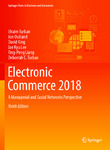Electronic Commerce 2018

View/
Date
2018Author
Turban, Efraim
Outland, Jon
King, David
Lee, Jae Kyu
Liang, Ting-Peng
Turban, Deborrah C.
Metadata
Show full item recordAbstract
Electronic commerce, the topic of this book, has grown rapidly, with companies like Facebook,
Google, Pinterest, LinkedIn, Uber, Alibaba Group, and Amazon.com setting new levels of
performance every year.
Electronic commerce (EC) is a business model in which transactions take place over electronic
networks, mostly the Internet. It includes the process of electronically buying and selling
goods, services, and information. Certain EC applications, such as online buying and
selling stocks and airline tickets, are reaching maturity, some even exceeding non-Internet
trade volume. However, EC is not just about buying and selling; it also is about electronically
innovating, communicating, collaborating, and discovering information. It is about e-learning,
e-customer service, e-government, social networking, problem-solving, and much more. EC is
having an impact on a significant portion of the world, affecting businesses, professions, trade,
and, of course, people. It is undoubtedly improving our quality of life.
A most important development in EC since 2014 is the phenomenal growth of social network
services, especially Facebook, Google+, and Twitter. Also impressive is the trend toward
conducting EC via mobile devices. Another major development is the global expansion of EC,
especially in China, where you can find the world’s largest EC company. In addition, attention
is given to artificial intelligence and its applications and to smart commerce as well as to the
use of analytics and big data to enhance EC. Finally, some emerging EC business models are
transforming industries (e.g., travel, banking, fashion, and transportation).
In the ninth edition (2017–2018), we bring forth the latest trends in e-commerce, including
smart commerce, social commerce, social collaboration, shared economy, innovations, and
mobility.
Collections
- School of Business [43]
